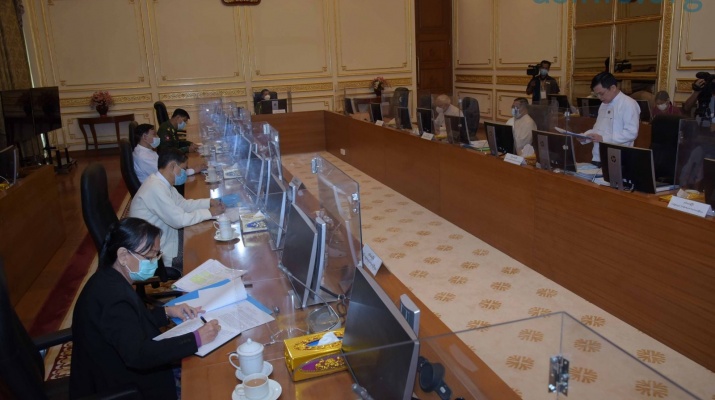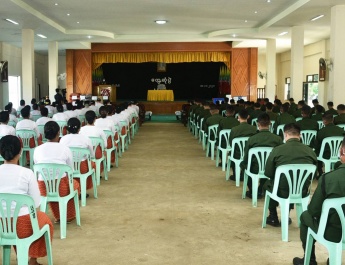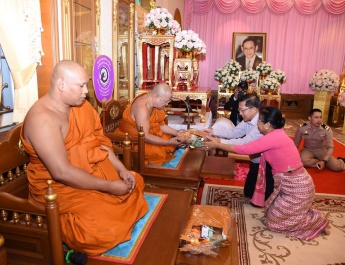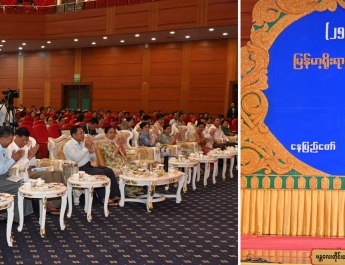Nay Pyi Taw February 18
Meeting 1/2021 of the Foreign Policy Committee was held at the State Administration Council Chairman’s Office here this after-noon, with an address delivered by Foreign Policy Committee Chairman State Administration Council Chairman Commander-in-Chief of Defence Services Senior General Min Aung Hlaing.
Also present at the meeting were members of the Foreign Policy Committee State Administration Council members General Mya Tun Oo, U Thein Nyunt and U Khin Maung Swe, Secretary Union Minister for Foreign Affairs U Wunna Maung Lwin, Union Minister for International Cooperation U Ko Ko Hlaing, Union Minister for Labour, Immigration and Population U Myint Kyaing, Deputy Minister for Planning, Finance and Industry Daw Than Than Lin, and Deputy Minister for Investment and Foreign Economic Relations U Than Aung Kyaw.
In his address, the Senior General said as regards the country’s foreign policy, section 41 of the Constitution states, “The Union practises independent, active and non-aligned foreign policy aimed at world peace and friendly relations with nations and upholds the principles of peaceful co-existence among nations.” As regards the country’s international stance of the security issue, section 42 (a) states, “The Union shall not commence aggression against any nation;” and section 42 (b) states, “No foreign troops shall be permitted to be deployed in the territory of the Union.”
He said Myanmar is located between the two powerful countries. The country needs special aware-ness as its shares a common border with the two. We must aware of the fact that international interest in Myanmar is high and it is based on the relations with the two countries. So the country must strictly observe the foreign policy stated in the Constitution. The country must ensure permanent peace and stability at the border areas and must establish eternally peaceful and stable and good neighbourly relations with immediate neighbours, Bangladesh, India, China, Laos and Thailand. The country cannot live in isolation. Thanks to the efforts of the Tatmadaw government in its time in the bilateral and international relations fields, the country could deepen its ASEAN and international relations. Neighbourly relations are important in the international relations sector. Therefore, the neighbouring countries must be the first to have better relations with.
As there are different policies and cultures in neighbourly relations, efforts will be made for mutual interests based on each country. Currently, there have been neighbourly amicable and eternal peaceful relations, and they must be further strengthened. Myanmar exercises a market economy inviting local and foreign investments. Investments from other countries, especially those from the neighbours with no strings attached are welcomed and encouraged if they are in the interests of the country and the people. With investments from the neighbouring countries, the role of migrant workers going there can be reduced. Thus, there will be better neighbourly friendship and contacts. Through these neighbourly relations, global tourism industry will improve more with more job opportunities and increased export.
Improved investment will lead to mass production of import-sub-stitute items. Then, the need for foreign income can be reduced as well. So, investments based on business type, job creation, pro-duction, export and import-substitute products must be encouraged and transactions must be done with the current foreign policies.
Myanmar is a member of the United Nations. Regarding the treaties and pledges the country have signed, it is necessary to respect all the provisions acceptable. Myanmar also has to deal with the international water territories. So it is also necessary to manage the water territories systematically and implement the agreements as quickly as possible. Security of the water territory also must be ensured.
There are a lot of Myanmar citizens working in other countries including neighbouring ones. There are legal migrant workers as well as illegal ones. As they are all Myanmar citizens, they must be protected. By seeking chances and opportunities, measures must be taken to provide protection of law to the Myanmar citizens abroad as much as possible. Opportunities must be sought for them if they want to return to Myanmar for various reasons. Recently, there were many who have offered to come back. But they have difficulty returning due to the COVID-19 outbreak. Various ways must be sought for their return. COVID-19 is a global pandemic, so extensive international cooperation is required. Measures for prevention, control and treatment, technical cooperation and information sharing are also wide and subtle. Therefore, effective international collaboration is necessary. Moreover, other endemic diseases occur occasionally. The Ministry of Health and Sports and the Ministry of Foreign Affairs need to respond quickly in technical cooperation with other countries in prevention, control and treatment measures.
The committee is responsible for adopting policies. There are many benefits for the country, especially international aid and loans. There are also special aid programmes.
Taking these chances without hesitation will facilitate national development. As for the immigration sector, there are Myanmar nationals who are working in other countries either legally or illegally. It is necessary to take those who are working illegally back to Myanmar and measures must be taken to enable them to work in other countries legally with the cooperation between the Ministry of Labour, Immigration and Population and its counterparts in respective countries where Myanmar nationals are working illegally. It is necessary for relevant ministries to cooperate to take measures to rescue Myanmar nationals who are victims of human trafficking in other countries, to prevent human trafficking and bring back the victims. As for displaced persons, measures must be taken to bring them back urgently in accordance with the policies of the State and bilateral agreements of successive periods and to respond to border affairs in accordance with bilateral agreements without delays.
Then, Members of the Foreign Policy Committee and Members of the State Administrative Council General Mya Tun Oo and U Khin Maung Swe , Secretary of the committee and Union Minister U Wunna Maung Lwin and Members of the committee Union Ministers U Myint Kyaing and U Ko Ko Hlaing reported to the Senior General on the formation of the committee, future tasks to be implemented in accordance with the guidelines of the State Administrative Council, promotion of international relations and cooperation in accordance with the 2008 Constitution, twelve tasks of the committee, measures to be taken with the approval of the committee and the government, plans to accelerate international relations and cooperation, formation of a team to recognize former Myanmar citizens as Myanmar citizens again, issuance of identity cards to Myanmar migrant workers illegally living in other countries, delays in repatriation of displaced persons in Bangladesh due to the discrepancies between the lists of people and measures to be taken to make the foreign policy of Myanmar known in international meetings.
Then, the Senior General said that measures are being taken to make the real situation of the country known to the international community and ways and means will be sought to deepen diplomatic relations. At the moment, the international community has maintained a more positive attitude towards the situation in the country than before. Bilateral agreements and commitments in international relations will be implemented. It is necessary to take measures to organize commemorative ceremonies for bilateral relations with other countries including China during the period in which the council has taken the responsibility of the state. The committee plays an important role in the promotion of economic relations with the international community. In conclusion, the Senior General urged the committee to place an emphasis on acceleration of the effort to revive the stagnant economy and international relations of the country.





